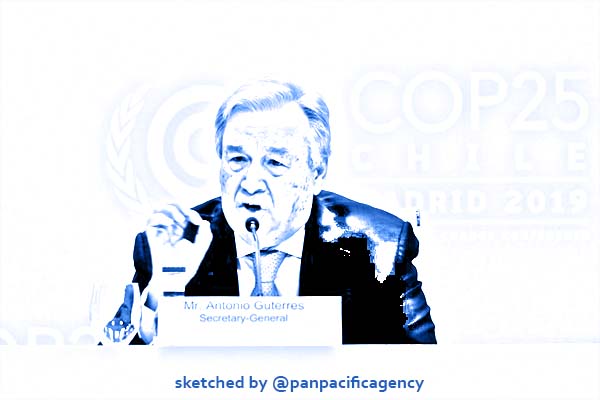UN Secretary-General Antonio Guterres slams India for coal subsidies

Guterres flagged a UN report to be released in a few days confirming the last five years are the warmest on record, with 2019 likely to be the second hottest ever. Sketched by the Pan Pacific Agency.
UN, Aug 28, 2020, The Hindu. United Nations Secretary-General Antonio Guterres on Friday criticised India for subsidising fossil fuels and promoting coal auctions. His remarks were part of the Darbari Seth Lecture organised by The Energy Resources Institute, Delhi, which was also attended by External Affairs Minister S. Jaishankar, The Hindu reported.
“Clean energy and closing the energy access gap are good business. They are the ticket to growth and prosperity. Yet, here in India, subsidies for fossil fuels are still some seven times more than subsidies for clean energy. Continued support for fossil fuels in so many places around the world is deeply troubling,” he said in pre-recorded message.
“Recent research on G20 recovery packages shows that twice as much recovery money has been spent on fossil fuels as clean energy. In some cases, we are seeing countries doubling down on domestic coal and opening up coal auctions,” he added.
Mr. Guterres commended several of India’s commitments to clean energy: for taking the initiative on the International Solar Alliance, plans for a World Solar Bank that would mobilise ₹70 trillion of investments in solar projects over the coming decade and committing to installing 500,000 MW of renewable energy by 2030.
His criticism of coal auctions is significant in the light of Prime Minister Narendra Modi’s launching an auction of 41 coal blocks for commercial mining on June 18, as part of India’s Aatma Nirbhar Bharat Abhiyaan.
At the launch, Mr. Modi said it marked not only the implementation of reforms to the coal mining sector but also the beginning of creation of lakhs of jobs and it would liberate the sector from decades of “lockdown”. The government had decided to spend ₹50,000 crore on creating infrastructure for coal extraction and transport, which would also create job opportunities for locals closer to their homes.
However, there has been severe criticism of the decision to auction these blocks, as independent analysts have said that it not only paves the way for destruction of pristine forests in Chhattisgarh, Jharkhand and Madhya Pradesh (which is where some of these potential blocks are located) but that investing in polluting coal plants was also economically unsound, given that renewable solar energy projects were far more sustainable. Mr. Guterres, too, underlined the latter point in his address.
“The coal business is going up in smoke. The advantages of India’s renewable energy resources are plain to see. They are low cost, protected from volatile commodities markets, and offer three times the job potential of fossil fuel power plants,” Mr. Guterres remarked.